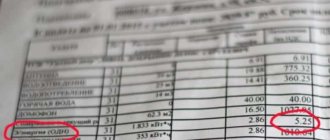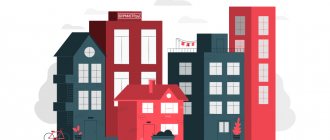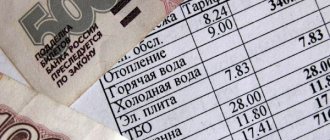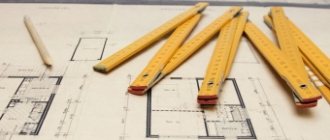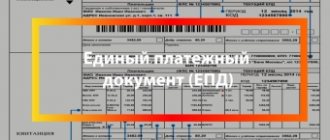Concept
The definition of common property of building residents is deciphered in Article 36 of the Housing Code (LC) of the Russian Federation. These are parts of the building that do not belong to anyone in particular . People use them together. Thus, the list includes the following objects:
- stairs and platforms;
- elevators and shafts;
- technical floors and premises;
- corridors;
- attics and basements;
- roofs;
- fencing;
- land plot under the building;
- additional communications;
- other.
Important: common property must be highlighted in the building's passport.
If the design is not indicated in the document, then charging money for maintenance is illegal. ODN is the cost of maintaining common property. For example, lighting is installed in the entrances. Light bulbs are not included in the apartment network. And someone has to pay for electricity consumption. Costs are spread across all owners. The same applies to heating common areas. The bill is issued to all residents in shares.
Download for viewing and printing:
Article 36. Ownership right to the common property of the owners of premises in an apartment building of the Housing Complex of the Russian Federation
What is commonly referred to as ODN
When making payments for provided utility services, the management company is obliged to strictly adhere to current legislative norms. General expenses include:
- loss of resources in intra-house communications, including leaks due to breakdowns, tests, flushing of systems and similar events;
- cleaning of premises;
- landscaping of the local area;
- lighting and heating of stairs, entrances, attics and basements;
- operation of special equipment, including elevator and intercom.
Attention: costs are determined using common household resource measuring devices (meters).
Legislation
Federal Law of the Russian Federation “On Amendments to the Housing Code of the Russian Federation and Certain Legislative Acts of the Russian Federation” No. 176-FZ dated June 29, 2015 amended the current legislation, under which, from January 1, 2017, fees for utilities include fees for cold water, hot water, electrical energy, thermal energy, gas, domestic gas in cylinders, solid fuel in the presence of stove heating, wastewater disposal fees, solid municipal waste management.
In the case of direct management of an apartment building by the owners of the premises, in cases where the owners of the premises in the apartment building have not chosen a management method or the chosen management method has not been implemented, the payment for utilities includes payment for cold water, hot water, electrical energy, thermal energy, gas, household gas in cylinders, solid fuel in the presence of stove heating, fees for wastewater disposal, management of solid municipal waste, including fees for individual utilities consumed during the maintenance of common property in an apartment building.
Thus, from January 1, 2021, all consumers in apartment buildings managed by management organizations, homeowners' associations, cooperatives, must pay for utility services - electricity only based on the volume of electrical energy consumed in residential premises, and payment for electricity , consumed during the maintenance of common property in an apartment building must be paid to the management organization, HOA, cooperative as part of the payment for the maintenance of residential premises.
The fundamental regulatory documents on the issue of payments for electrical energy supplied to multi-apartment residential buildings, including that for general household needs, are (see the section “Regulatory Documents”):
- Civil Code of the Russian Federation.
- Housing Code of the Russian Federation.
- Rules for the provision of utility services to owners and users of premises in apartment buildings and residential buildings, approved by the Decree of the Government of the Russian Federation of May 6, 2011. No. 354.
- Rules mandatory when a management organization or a homeowners' association or a housing cooperative or other specialized consumer cooperative concludes contracts with resource supply organizations, approved by the Decree of the Government of the Russian Federation dated February 14, 2012. No. 124.
- Basic provisions for the functioning of retail electricity markets, approved by the Decree of the Government of the Russian Federation dated May 4, 2012. No. 442.
- Federal Law of November 23, 2009 N 261-FZ “On energy saving and increasing energy efficiency and on introducing amendments to certain legislative acts of the Russian Federation.”
In accordance with Art. 544 of the Civil Code of the Russian Federation, payment for energy is made for the amount of energy actually accepted by the consumer in accordance with the data of the meter.
According to paragraph 1 of Art. 157 of the Housing Code of the Russian Federation, the amount of payment for utilities is calculated based on the volume of consumed utilities, determined by the readings of metering devices, and in their absence, based on the standards for the consumption of utilities. When calculating payments for utility services for owners of premises in apartment buildings, who have an obligation established by the legislation of the Russian Federation to equip their premises with meters for metering the electrical energy used and whose premises are not equipped with such meters, increasing coefficients are applied to the consumption standard for the corresponding type of utility service in in the amount and in the manner established by the Government of the Russian Federation.
The owner of premises in an apartment building is obliged to bear the costs of maintaining the premises he owns, as well as to participate in the costs of maintaining common property in proportion to his share in the right of common property (Article 158 of the Housing Code of the Russian Federation).
Article 13 of the Federal Law of November 23, 2009 No. 261-FZ “On energy saving and increasing energy efficiency and on introducing amendments to certain legislative acts of the Russian Federation” states that produced, transmitted, consumed energy resources are subject to mandatory accounting with the use of metering devices for used energy resources.
Until September 1, 2012, utility services were provided in the manner prescribed by the Rules for the provision of utility services to citizens, approved by Decree of the Government of the Russian Federation of May 23, 2006 No. 307. At the same time, payments for utility resources, including for consumed electricity, were made according to readings of common house metering devices, ODN was distributed in proportion to consumption not only to consumers - individuals who have individual metering devices, but also to consumers - individuals who do not have individual metering devices (calculated according to electricity consumption standards), as well as to non-residential premises, are accounted for by the common house metering device.
From September 1, 2012, in accordance with the Rules for the provision of utility services to owners and users of premises in apartment buildings and residential buildings, approved by Decree of the Government of the Russian Federation dated May 6, 2011 No. 354, the volume of utility services provided during the billing period for general house needs is calculated and distributed among consumers in proportion to the size of the total area owned by each consumer (in his use) of residential and non-residential premises in an apartment building.
According to the changes made by Government Decree of the Russian Federation No. 1498 of December 26, 2016 to the Rules for the provision of utility services to owners and users of premises in multi-apartment residential buildings and residential buildings, approved by Government Decree No. 354 of May 6, 2011, the algorithm for presenting a negative ODN has changed:
Payment for the corresponding type of utility service provided for the billing period for common house needs is not charged to consumers if, when calculating the volume of utility service provided for the billing period for common house needs, it is established that the volume of the utility resource determined based on the readings of the collective (common house) appliance accounting for this billing period is less than the sum of the volumes of the corresponding type of utility service provided for this billing period to consumers in all residential and non-residential premises in the house.
What the law says
The maintenance of the common space of an apartment building is regulated by the following regulations:
- Housing Code (Article 156);
- Decrees of the Government of the Russian Federation: No. 354 of 05/06/11;
- No. 344 dated 04/16/13.
In Article 156 of the Housing Code, the obligation to repay the costs of ODN is assigned to tenants and owners of premises. The calculation procedure is deciphered in Resolution No. 354. And in document number 344, the Government of the Russian Federation established restrictions on the amounts accrued. They are:
- payment cannot exceed a certain threshold;
- charges for sewerage have been cancelled;
- water supply tariffs have been reduced.
Attention: for buildings that are not provided with common meters, increasing coefficients have been established.
Article 156 of the Housing Code of the Russian Federation “Amount of payment for residential premises”
Decree of the Government of the Russian Federation of May 6, 2011 N 354 On the provision of utility services to owners and users of premises in apartment buildings and residential buildings
Decree of the Government of the Russian Federation of April 16, 2013 N 344 On amendments to certain acts of the Government of the Russian Federation on the provision of utility services
How does electricity enter the house?
The total amount of electricity supplied through the input distribution device to the house's intra-house networks is recorded by a common house meter, and then goes to apartments and common areas. Electrical energy supplied to the apartment is measured by individual metering devices.
All remaining energy is consumed for the operation of lighting devices in common areas and for the operation of electrical equipment that is part of the common property in an apartment building.
In accordance with Decree of the Government of the Russian Federation of August 13, 2006 No. 491, the composition of common property includes:
a) premises in an apartment building that are not parts of apartments and are intended to serve more than one residential and (or) non-residential premises in this apartment building: inter-apartment landings, stairs, elevators, elevator and other shafts, corridors, strollers, attics, technical floors (including built-in garages and areas for motor transport, workshops, technical attics built at the expense of the owners of the premises) and technical basements in which there are engineering communications, other equipment serving more than one residential and (or) non-residential premises in an apartment building (including boiler rooms, boiler rooms, elevator units and other engineering equipment);
b) other facilities intended for the maintenance, operation and improvement of an apartment building, including transformer substations, heating points intended to serve one apartment building, collective parking lots, garages, children's and sports grounds located within the boundaries of the land plot on which the apartment building is located .
Calculation methodology
The amounts in the bills directly depend on the availability of communal measuring equipment. Collective meters allow for accurate accounting of resource consumption. This means that people only pay for the services they use. If there are counters, calculations are made as follows:
- Readings are taken from the collective device and the amount of resource consumed per month is determined.
- The volume used by the apartments is subtracted from the resulting figure.
- The result is divided between owners and tenants.
Hint: if the building has apartments without meters, then they are calculated according to the consumption rate.
In the absence of a collective metering device, calculations are made according to consumption standards. The result depends on the area of the common space and tariffs. Payment is divided between people taking into account the area of occupied premises.
Additional volume
Citizens take readings from metering devices at different times. This is taken into account in the calculations. That is, the method described above is a diagram. When determining charges, a special formula is used to take into account the average indicator established based on available data.
For information: if you take readings from metering devices at the same time, the charges will decrease.
How to reduce costs for one-day visits
The legislation of the Russian Federation obliges citizens to maintain common property (Article 156 of the Housing Code). It is not possible to refuse to deposit money. However, people can significantly reduce this expense item. Experts recommend doing the following:
- Install collective meters for metering the consumption of relevant resources, if this has not already been done.
- Agree with your neighbors about the time for instant readings. This allows you to get rid of additional volumes.
- Adopt at the general meeting a rule on paying money for utilities before a certain date. This method also affects the final amounts.
- Monitor the readings of collective meters in order to prevent violations by the management company.
Attention: the ODN standard is established by regional authorities. If the amounts billed to residents are too high, you should contact the management company for a recalculation.
Is the inspection order illegal?
The court of first instance sided with the management organization. He indicated that although the law obliges the company to carry out recalculation, such a procedure for recalculation has not been approved, and therefore there is no possibility for such a recalculation.
In addition, the management company itself contacted the Ministry of Construction of the Russian Federation for clarification and received an answer that it could not recalculate the fee on its own without waiting for the appropriate procedure to be established by the Government of the Russian Federation.
The housing inspector's order was declared illegal.
What happens if you don't pay
The legislation clearly states the obligation of citizens to pay ODN. In addition, there are rules for holding non-payers accountable. The methods are:
- Accrual of penalties. This is carried out from the 31st day from the date of mandatory deposit of funds. And the latter is set until the 10th day of the month following the period of use of the services.
- Warning about disconnection from communications.
- Filing a claim in court.
The statute of limitations for utility payments is three years. Therefore, the management company will not delay for long in going to court. After all, in three years the debts will have to be written off.
Arbitrage practice
Pensioner Ivanov regularly complained about poor quality service by the management company of the house in which he lived. The claims were of the following nature:
- The elevator regularly broke down and stood idle for several days and sometimes weeks.
- The light bulbs in the entrance had to be screwed in by the residents themselves.
- But in the payment slips there was always a line about the contribution to ODN.
The pensioner sent written demands to rectify the situation to the management company. I collected all the papers. After some time, based on the accumulated evidence base, he filed a lawsuit. Upon review of the case, the following emerged:
- The facts stated in the claim were fully confirmed.
- The defendant was unable to justify the amount of the contribution to the ODN billed to the pensioner.
- The building did not have a properly registered collective electricity meter.
- The defendant was unable to reliably confirm the fact of taking readings from the meter.
Taking into account all the factors, the court fully satisfied Ivanov’s claim. In addition, the pensioner shared his experience with his neighbors, who hired a lawyer to defend their rights. The management company recalculated accruals for the three previous years for everyone who took part in the event.
